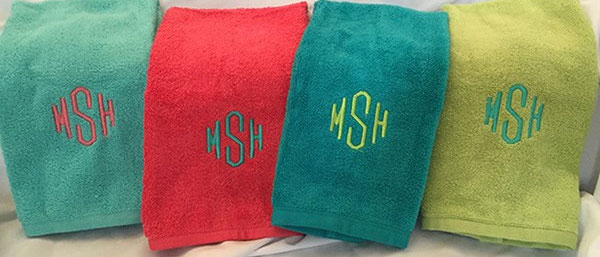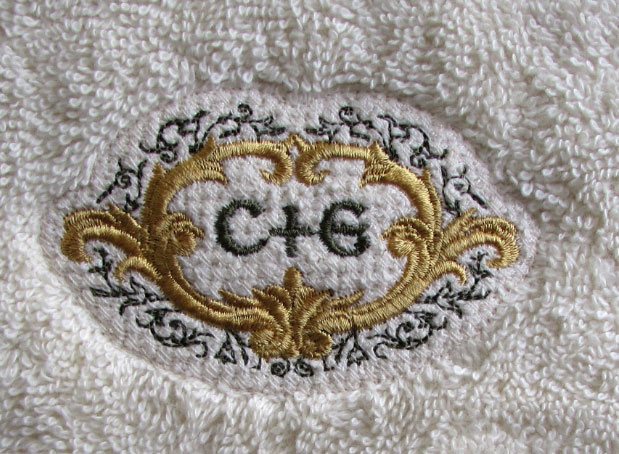October 18, 2017
Embroidery Tricks for Towels and Other Plush Fabrics
The plush fabric of towels, bathrobes, polar fleece and even stuffed animals requires special considerations for embroidery professionals.
Bathrobes, beach towels, polar fleece and stuffed animals are plush and luxurious, the fabric beautiful to both hand and eye. However, high-pile fabrics like terrycloth and fleece can be an embroidery nightmare. Unless the proper techniques are used, the embroidery may get lost in the pile of the fabric. While you’re limited only by your own creativity here are a few ways to approach this fuzzy conundrum.

Use a water-soluble topping. This will create a smooth surface for clearer embroidery on terry cloth, fleece and other textured fabrics. Stitches won’t sink in, and you’ll get a cleaner look to your finished product. To use, simply hoop a sheet on top of your fabric and stitch as usual. Once your design is complete, you pull the material off the fabric. A simple tug will remove most of the topping leaving a beautiful design behind, but to remove the remnants you might need a spray bottle or damp sponge dissolve the remaining topping.
Herein lies a potential problem with water-soluble topping. While it’s an excellent method for holding down the pile at first, once the product is laundered, the soluble material holding the pile under the stitches will dissolve and may let it through the embroidery. This can be compensated for with other techniques, but once a product is washed you stand the risk of the fabric popping through the embroidery.

Use a knock-down fill. This is more or less just like it sounds. A knock-down fill is usually a set of two light(er) density fills programmed at opposing angles that are applied before an actual design is embroidered. The idea is to use the light fill as a mesh to hold down the pile. This is a highly effective method of controlling the loops in a bathrobe or wales in corduroy but it also has its own set of challenges. What is most noticeable is the design will now have a very discernible edge. Only you and your customer can say if this is an acceptable trait, but it is something you should be aware of.
Use appliqué. Covering the pile completely with beautiful material is probably the most comprehensive method of winning the “war on loops.” While deep-pile materials aren’t the primary reason for using appliqué, the decoration method is a very effective way to solve the pile problem. There are a couple of things to keep in mind, though. First, the stitching on the edge of the appliqué still requires special attention, so the pile does not poke through the border stitches. Also, cutting out appliqués (especially complex shapes) can be its own very special challenge.
Design with plush materials in mind. Last, but not least, is to plan for this material from the start. If you’re careful and have the ability to create a design from the ground up, you can significantly impact the need to do anything special to the material. While this may not work in all situations, it will in many. Big, bold columns lend themselves much better to higher-density top stitches and aggressive underlays like a double zig-zag underlay. A double zig-zag underlay can go a long way to taming a deep pile, but if your column stitches are too narrow, then a double zig-zag may be too many stitches in too small a space.
Plush fabrics are beautiful and very versatile, but many embroiderers shy away from tackling these projects. With a little bit of creativity and an understanding of how to hold down the loops, there’s no reason to be intimidated by this substrate. The most effective tool you have in your kit is an understanding what needs to be done and the ability to get past the challenge.
***
Steve Freeman is the managing partner of Qdigitizing.com. He has been a professional digitizer since 1989 and is trained on Melco, Wilcom and Pulse software systems. Prior to Qdigitizing, he was an embroidery manager at Zazzle.com, and before that, he owned and operated a 60-head embroidery company for 15 years. You can reach him at steve.freeman@qdigitizing.com or (877) 733-4390.